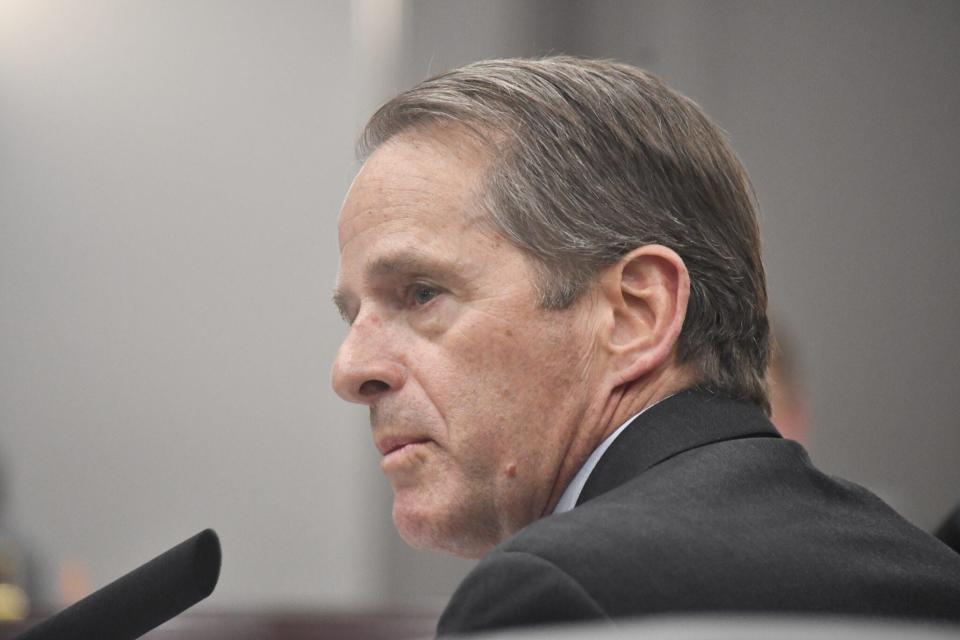Federal judge: NH 'divisive concepts' law restricting teachers is unconstitutional
- Oops!Something went wrong.Please try again later.
CONCORD — A federal judge ruled Tuesday the state’s “divisive concepts” law is unconstitutional, calling out state Education Commissioner Frank Edelblut by name in the process.
The court found the prohibition on educators in public schools regarding how race, gender and sexual orientation are discussed was so “fatally vague” that it violates the Fourteenth Amendment. New Hampshire U.S. District Judge Paul J. Barbadoro wrote the ambiguity of the law meant it doesn’t provide guidance to educators about what they could and could not teach in their classes, meaning they would be “gambling with their careers” when trying to figure out which diversity efforts they could speak on, and that it allowed for educators to be punished without a finding that they had knowingly broken the law.
Further, because of the vagueness of the law, the court states, “the department relies on Edelblut’s personal views” when it comes to enforcement.

“The amendments are viewpoint-based restrictions on speech that do not provide either fair warning to educators of what they prohibit or sufficient standards for law enforcement to prevent arbitrary and discriminatory enforcement," read the conclusion of the court order. "Thus, the amendments violate the Fourteenth Amendment to the U.S. Constitution."
The decision was cheered by educators and others who have criticized the law as being part of conservative culture wars.
What is the 'divisive concepts' law?
The “divisive concepts” law, enacted in 2021, restricts teachers in the Granite State. It prohibits teaching concepts like “an individual, by virtue of his or her race or sex, is inherently racist, sexist, or oppressive, whether consciously or unconsciously.”
Teachers in the state have said the law has had a chilling effect, leaving them unsure of what they can and cannot discuss in the classroom. One example, cited in the court ruling, was when Patrick Keefe, a high school English teacher at Campbell High School, changed the way he taught the novel "Beloved" by Toni Morrison, which tells the story of a formerly enslaved woman in the post-Civil War era, because of fears he had over the law.
Shortly after the law went into effect, educators Andres Mejia, Christina Kim Philibotte and NEA-NH, as well as the American Federation of Teachers, filed two lawsuits against Education Commissioner Frank Edelblut, which were then consolidated into one. On Tuesday, Barbadoro ruled in favor of the plaintiffs.
Mejia is the outgoing diversity, equity and inclusion director for SAU 16 schools in the Exeter area.
Ruling cheered by teachers unions, diversity and equity leaders; criticized by conservatives
The ACLU, New Hampshire teachers’ unions, and other stakeholders applauded the ruling.
“Today’s court victory means that educators across New Hampshire can nurture an equitable and inclusive school environment where all students are seen and heard,” said Philibotte and Mejia, the two New Hampshire school administrators who were plaintiffs in the case, in a prepared statement. “It is critically important that students see themselves in the books they read and in the classroom discussions they have to ensure that they feel cared for and valued.”
ACLU-NH legal director Gilles Bissonnette called the court ruling a “victory for academic freedom” and said ACLU-NH is grateful to the court “for stopping the culture of fear and apprehension.”
“New Hampshire’s ‘banned concepts’ law stifled New Hampshire teachers’ efforts to provide a true and honest education,” said Megan Tuttle, NEA-NH president. “Students, families, and educators should rejoice over this court ruling which restores the teaching of truth and the right to learn for all Granite State students.”
Heidi Carrington Heath, the executive director of Seacoast Outright, an organization supporting LGBTQ+ youth in the Seacoast, said the decision was an “essential win” for LGBTQ+ youth and for honest education.
Republican gubernatorial candidate Chuck Morse, who was New Hampshire Senate president when the law was enacted and “championed” HB 544, the legislation that originally contained the phrase “divisive concepts” that was passed in the state budget, said in a statement that he is “deeply disappointed” by the court’s decision.
“I remain steadfast in my commitment to ensuring that our classrooms are places of learning and respect, free from divisive and racist ideologies,” Morse said in a statement. “As governor, I will work tirelessly with lawmakers, educators, and community leaders to draft and pass a stronger bill that addresses the court's concerns while keeping our fundamental goal intact: to prevent the dissemination of any materials that promote racial superiority or inferiority.”
Mike Garrity, spokesperson for the New Hampshire attorney general, said, “The state is currently reviewing the court’s order and will consider next steps, including whether to appeal.”
This article originally appeared on Portsmouth Herald: Federal judge: NH 'divisive concepts' law is unconstitutional

